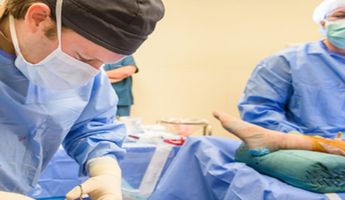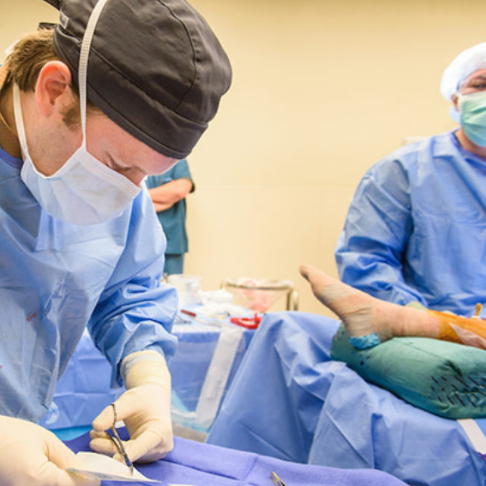Tendon Repair in Munich
Search and Compare the Best Clinics and Doctors at the Lowest Prices for Tendon Repair in Munich

Find the best clinics for Tendon Repair in Munich
No pricing info available
Russian Federation offers the best prices Worldwide
Price: $ 828
From 24 verified reviews
Maysan Nashashibi, 09 September 2020
She's the best Dr. , the kindest and very very patient while explaining everything. Very understanding and she never underestimate with her knowledge and time.
From 70 verified reviews
Mirca Lotz, 15 September 2020
Great clinic nice staff, definitely recommended
WHY US?
At Medijump, we're making medical easy. You can search, compare, discuss, and book your medical all in one place. We open the door to the best medical providers worldwide, saving you time and energy along the way, and it's all for FREE, no hidden fees, and no price markups guaranteed. So what are you waiting for?

Free

Best Price

Widest Selection

Risk-Free
What you need to know about Tendon Repair in Munich

Tendon repair is a surgical procedure to treat a torn or damaged tendon – the soft stretchy tissues that connect muscles to the bone and helps to protect joints from damage. The purpose of Tendon Repair is to restore normal movement to a joint as tendon injuries are very painful and can make it difficult to move. Tendon repair is mostly performed on people with a deep cut that severs a tendon, an injury, or tears due to rheumatoid arthritis, or an injury from contact sports.
What does a Tendon Repair Procedure Involve?
Tendon repair surgery can be performed under local, regional, or general anesthetic, depending on your medical history and the location of the affected tendon. The procedure starts by making an incision in the skin over the injured tendon, then any damaged tendon is removed and the ends of the torn tendon are sewed together. The final step is closing the incision with sutures and covering the area with sterile dressing or bandages.
How Long Should I Stay in Munich for a Tendon Repair Procedure?
Although tendon repairs are usually performed as an outpatient procedure (meaning you can leave the hospital on the same day of the surgery), you should aim to stay in Munich for 5 to 7 days. As you will need to attend follow-up hospital checkups where your surgeon will remove the stitches and monitor your healing
What's the Recovery Time for Tendon Repair Procedures in Munich?
The total period for recovery can take around 12 weeks, but you should rest for 6 weeks to aid a speedy recovery. Make sure to ask your doctor about the recovery timeline. Also, remember that you should avoid doing any exercises (including therapy exercises) until your surgeon allows you to do so.
What sort of Aftercare is Required for Tendon Repair Procedures in Munich?
Your surgeon will give you aftercare instructions, which may include wound care and dietary restrictions. For the first few days following the surgery, make sure to keep the affected area elevated to avoid swelling and pain. Your surgeon may also recommend physical therapy or occupational therapy exercises to regain your range of motion.
What's the Success Rate of Tendon Repair Procedures in Munich?
The sooner the procedure is carried out after injury, the higher the success rate. However, there are some minor side effects and risks associated with the procedure, including loss of joint use, re-tearing of the tendon, stiffness of the joint, scar tissue, as well as problems with anesthesia.
Are there Alternatives to Tendon Repair Procedures in Munich?
Physical therapy can be an alternative if you do not want to undergo surgery, but in some severe cases, you need both surgery and physical therapy to treat your damaged tendon effectively.
What Should You Expect Before and After the Procedure
Before a Tendon repair, your movement and mobility may be limited as it can be very painful for you to move a joint. After the surgery, you should slowly regain your range of motion. Once you have recovered fully, you may be able to move like you used to before the damage to your tendon.
Whilst the information presented here has been accurately sourced and verified by a medical professional for its accuracy, it is still advised to consult with your doctor before pursuing a medical treatment at one of the listed medical providers
No Time?
Tell us what you're looking for and we'll reachout to the top clinics all at once
Enquire Now

Popular Procedures in Munich
Prices Start From $1,376

Prices Start From $125

Prices Start From $2,050

Prices Start From $15

Recommended Medical Centers in Munich for Tendon Repair

- Interpreter services
- Translation service
- Religious facilities
- Medical records transfer
- Medical travel insurance
- Health insurance coordination
- TV in the room
- Safe in the room
- Phone in the room
- Private rooms for patients available

- Interpreter services
- Translation service
- Religious facilities
- Medical records transfer
- Medical travel insurance
- Health insurance coordination
- TV in the room
- Safe in the room
- Phone in the room
- Private rooms for patients available

- Interpreter services
- Translation service
- Religious facilities
- Medical records transfer
- Medical travel insurance
- Health insurance coordination
- TV in the room
- Safe in the room
- Phone in the room
- Private rooms for patients available

- Interpreter services
- Translation service
- Religious facilities
- Medical records transfer
- Medical travel insurance
- Health insurance coordination
- TV in the room
- Safe in the room
- Phone in the room
- Private rooms for patients available

- Interpreter services
- Translation service
- Religious facilities
- Medical records transfer
- Medical travel insurance
- Health insurance coordination
- TV in the room
- Safe in the room
- Phone in the room
- Private rooms for patients available

- Interpreter services
- Translation service
- Religious facilities
- Medical records transfer
- Medical travel insurance
- Health insurance coordination
- TV in the room
- Safe in the room
- Phone in the room
- Private rooms for patients available

- Interpreter services
- Translation service
- Religious facilities
- Medical records transfer
- Medical travel insurance
- Health insurance coordination
- TV in the room
- Safe in the room
- Phone in the room
- Private rooms for patients available
Tendon Repair in and around Munich
About Munich
Munich is the largest city in Southern Germany and it is one of a few places on earth where traditional and modern sit side by side, with its royal palaces and high-tech cars. Known as the ‘city of art and beer,’ this city is famous for its annual beer festival known as Oktoberfest. What most people do not realize is that Munich is also one of the world’s most famous medical tourism destination. Thanks to the famous German education system that creates skilled specialists, as well as state-of-the-art medical centers that invest in the latest medical technology, medical tourism in this city is a booming business that continues to grow at a fast rate. International patients usually travel to the city for quality rather than the price.
Popular Parts of Munich
Munich boasts a beautiful historic center, amazing German food, large parks and gardens, and beer halls packed with welcoming people. Visitors can explore numerous historical buildings, such as the Church of St. Peter and Frauenkirche. These two buildings have been around for centuries and are located in Munich’s Old Town. One of the most popular attractions in the city is Alte Pinakothek, which is an important art museum that houses over 800 works from the 14th – 18th centuries from German masters. Those who want to have a picnic, hike, simply relax or even try surfing should visit the English Garden. Other popular places include Dachau Concentration Camp, Nymphenburg Palace, BMW Museum, and Deutsches Museum.
Transport in Munich
The international airport of Munich is Munich Airport, which is the second-busiest airport in Germany in terms of passenger traffic. It serves international flights from many cities around the world, including Dubai, Bangkok, and Atlanta. Munich has a comprehensive network of public transportation that will take visitors virtually anywhere around the city. The most common transit system is the U-Bahn, which is a fast and easy underground subway system. Buses, trams, and commuter trains are also available and each has a vast network. Taxis are easy to hail, reliable, and safe. However, they are a bit pricey and Uber operates in Munich.
Visas in Munich
As a member of the Schengen Area, Germany allows citizens of several countries, including Australia, New Zealand, the US, and Poland to enter and stay in the country without a visa for up to 90 days. Citizens of other countries not listed in the visa-free entry need to obtain a visa to visit the country. Always check the requirements for Germany Visa Application before applying.
Weather in Munich
From June to August is the summer, which is a popular time to enjoy outdoor activities as the temperatures hover around 24°C. On very hot days, the temperatures can reach 30°C. Autumn (September – October) and spring (March-May) has pleasant weather with mild temperatures. Winter can be very cold, with temperatures dropping as low as -10°C.
Additional Info
- Local Currency: Euro (EUR) is the official currency. 1 EUR is approx. 1.12 USD.
- Money & Payments: ATMs are easy to find. Credit cards are not widely accepted and tipping is common practice.
- Local Language: The official language is German. Many people, particularly in tourism areas, understand English to some extent.
- Local Culture and Religion: Christianity is the largest religion in the city, followed by Islam, Buddhism, Hinduism, and Judaism.
- Public Holidays: Munich celebrates numerous holidays, including New Year’s Day and Christmas Day. It also hosts several festivals throughout the year, such as Oktoberfest in October.
Popular Searches
- Plastic Surgery in Thailand
- Dental Implants in Thailand
- Hair Transplant in Thailand
- Breast Augmentation Thailand
- Gastric Sleeve in Thailand
- Gender Reassignment Surgery in Thailand
- Laser Hair Removal in Bangkok
- Botox in Bangkok
- Dermatology in Bangkok
- Breast Augmentation in Bangkok
- Coolsculpting in Bangkok
- Veneers in Turkey
- Hair Transplant in Turkey
- Rhinoplasty in Turkey
- Stem Cell Therapy in Mexico
- Rhinoplasty in Mexico
- Liposuction in Mexico
- Coolsculpting in Tijuana
- Rhinoplasty in Korea
- Scar Removal in Korea
- Gastric Sleeve in Turkey
- Bone Marrow Transplant in India
- Invisalign in Malaysia
- Plastic Surgery in the Dominican Republic
- Tummy Tuck in the Dominican Republic
- Plastic and Cosmetic Surgery in Poland
- Rhinoplasty in Poland
- Hair Implant in Poland
- Dental Implants in Poland
- IVF in Turkey

